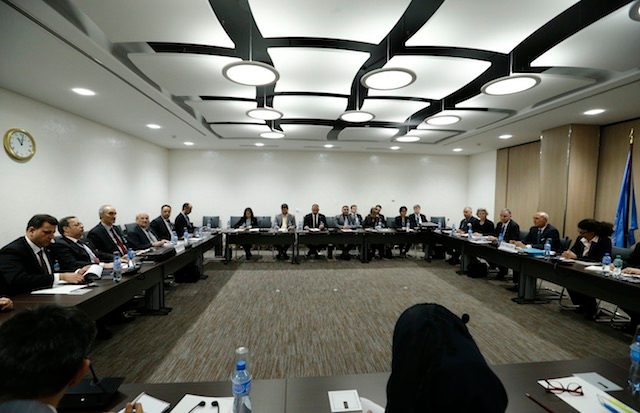SUMMARY
This is AI generated summarization, which may have errors. For context, always refer to the full article.

ZABADANI, Syria – The UN began evacuating hundreds of wounded people from besieged Syrian towns Wednesday, April 20, in a rare sign of humanitarian progress amid faltered peace talks and a fraying ceasefire.
In Geneva, the Syrian government said it was pushing on with indirect negotiations, calling the opposition’s freeze on its participation “absurd theater.”
The anti-government High Negotiations Committee this week suspended its participation in the UN-brokered talks until it could see progress on political transition and humanitarian issues.
On Wednesday, the UN secured the evacuation of dozens of people needing medical attention from four besieged towns as part of a complex humanitarian mission.
“Plans are underway to evacuate some 500 people including the sick, wounded and their family members” from 4 besieged towns “in urgent need of life-saving medical attention,” said UN spokesman Stephane Dujarric.
On the outskirts of the rebel-held town of Madaya, 7 large white buses carrying evacuated residents stopped along a route lined by shrubbery.
Dozens of men, women and children got out of the bus and were checked by security officials before boarding once more, an Agence France-Presse journalist said.
A similar operation had occurred earlier outside nearby Zabadani, where 25 men were transported out of the town, the journalist said.
The simultaneous evacuations were taking place Wednesday from rebel-held Zabadani and Madaya near Damascus, and the government-held towns of Fuaa and Kafraya in northwest Idlib province.
Madaya shot to infamy in December 2015 when dozens of residents starved to death.
Sieges continue
Aid deliveries to the 4 localities always occur simultaneously and in equal amounts, and a similar stipulation applied on Wednesday for those being evacuated.
More than 4 million in Syria live in besieged or hard-to-reach areas, with limited or no access to food or medical supplies.
The UN has long pressed Damascus to grant unrestricted access to these areas, and has asked all sides to end besiegement.
Despite fierce criticism, the regime frequently denies passage to aid convoys or limits what kind of assistance can enter.
The dire humanitarian situation has played a major role in the opposition walking away from the troubled peace talks in Geneva.
An already-shaky ceasefire between the government and non-jihadist rebels was severely strained on Tuesday after at least 44 people were killed in air strikes on two markets in northwest Syria.
The deaths of 37 civilians in a market in the city of Maaret al-Numan and another seven killed in nearby Kafranbel were some of the deadliest attacks since the truce took hold on February 27.
On Tuesday, April 19, the HNC coordinator said the opposition delegation could not remain in Switzerland while more Syrians died.
“It is not suitable, neither morally nor on the humanitarian side, to be part of negotiations when Syrians are dying daily from sieges, hunger, bombings, poisonous gases and barrel bombs,” said Riad Hijab.
‘Politically immature’
But the head of Syria’s government delegation lambasted the opposition for its move, calling it “absurd theater” and accusing Hijab of being “politically immature”.
Bashar al-Jaafari spoke to journalists after meeting UN mediator Staffan de Mistura’s deputy Ramzy Ezzeldin Ramzy.
“The UN considers the talks to be ongoing in spite of the withdrawal,” said Jaafari.
The talks are aimed at putting an end to Syria’s five-year war with a political transition, a new constitution, and fresh elections by September 2017.
But the main stumbling block remains the fate of President Bashar al-Assad, whom the opposition insists cannot be a part of a transitional government.
The regime, however, says it will only agree to a “broad-based unity government” – not a transitional body.
Jaafari said the new government would include current government members, as well as “representatives from the opposition… technocrats and independent figures.”
He added that only opposition members “who reject terrorism (and) who do not work for the sake of a foreign agenda” would be permitted to join.
According to his definition, this would rule out the HNC, which he described as a group of “extremists, terrorists and mercenaries” working for regional powerhouses Saudi Arabia and Turkey.
Washington said it disagreed with his stance.
“We do not believe… that the way forward is any removal by the opposition from these talks,” said US State Department spokesman John Kirby. “In fact, quite the contrary.”
In the northeastern city of Qamishli, meanwhile, deadly clashes raged between pro-government fighters and Kurdish forces, said an Agence France-Presse reporter at the scene.
A Kurdish security source said “a number of our comrades” died but declined to give a figure.
The Syria conflict which has cost more than 270,000 lives began as a peaceful revolt demanding democratic change, but evolved into a multi-front civil war after the regime unleashed a brutal crackdown on dissent. – Maher Al Mounes, AFP / Rappler.com
Add a comment
How does this make you feel?
There are no comments yet. Add your comment to start the conversation.